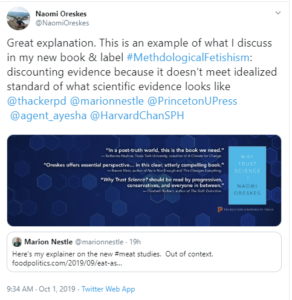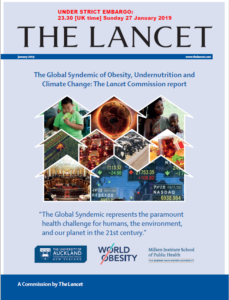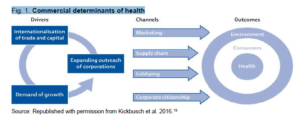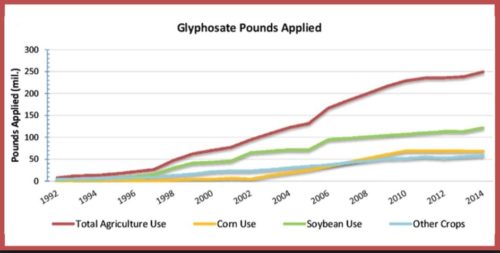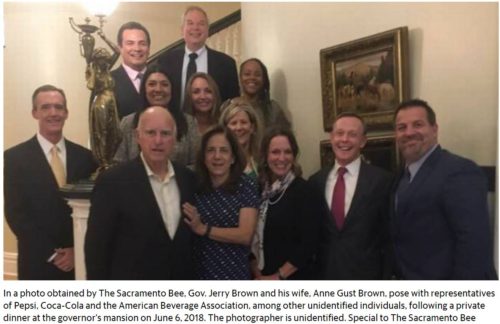NutraIngredients.com: An Exchange with its editor
I’m glad you wrote this and hope it will open up an opportunity for an ongoing conversation about industry-funded research and the conflicts it generates…..I am a constant and grateful reader of your and other Reed newsletters, and greatly admire the consistently outstanding and objective reporting. I have only one ask: if a study is funded by a company with a vested interest in its outcome, ask your reporters to be sure to state who the funder is.
Mr. Schultz wrote back and after some cordial back-and-forth asked if he could do an interview for the newsletter. Of course he could. Here is the result.
Bias inherent in company funded research calls value of evidence into question, critic maintains
In a recent NutraIngredients-USA commentary it was argued that dietary supplement companies that build up a suite of research do so carefully, and plan for success. With a careful design of the research program, positive results at the bench can naturally translate into successful randomized, placebo controlled trials.
Longtime critic of industry funded research
Marion Nestle, PhD, nutrition professor at New York University and author of the influential book Food Politics as well her most recent work Unsavory Truth: How Food Companies Skew the Science of What We Eat, isn’t buying. Nestle responded to NutraIngredients-USA on the subject of the commentary to say that she has reviewed hundreds of company-funded studies and in her view the inherent biases built into that system are next to impossible to overcome.
Indeed, on her blog (also titled Food Politics) Nestle has a frequent feature called “Industry funded research of the week.” The feature is used to document instances of bias, which to Nestle’s eye are thick on the ground.
“The overriding issue is that industry-funded research almost invariably comes out with results favorable to the sponsor’s interests. This is so predictable that I can often recognize the funder by the title of the paper,” Nestle told NutraIngredients-USA.
Nestle noted that the phenomenon is not by any means restricted to research on food and supplement ingredients. It has been noted in studies on tobacco, chemicals and pharmaceuticals.
“Studies of these industries show that the influence apparently occurs at an unconscious level; investigators did not intend to be influenced and do not recognize that they were influenced. But the evidence for funding effects is overwhelming,” she said.
Bias starts with study design
Nestle said a key issue is how the research question is framed. Companies investing in research naturally want to succeed and get some return on their investment. But the best science doesn’t come when the question is framed in such a way that a positive result is overwhelmingly likely, she said.
“I get letters all the time from trade associations asking for proposals for research that will demonstrate the benefits of their products. That is not the same as asking open-ended questions about effects. Companies want data on benefits for marketing purposes. That’s why I view industry-funded studies as about marketing, not science,” Nestle said.
Nestle said she has noted that some of the larger funders, such as the larger food companies or industry associations supporting categories of products like walnuts, almonds, strawberries or what have you, churn out research supporting their products of interest. While some might argue this adds to the totality of evidence and thus could be a good thing, Nestle said she doubts the value of these investments when taking the inherent biases into account. This can result in studies that seek to demonstrate things like substituting junk food calories with a serving of something like almonds or strawberries is a good thing to do. Yes, but so what? In Nestle’s view, this kind of bias is all but inevitable in research funded in this way.
“That’s what decades of research on the effects of drug-industry funding says, and the few studies looking at funding effects in nutrition find similar results,” she said.
Independent funding mechanism
What Nestle said she’d like to see is a mechanism for funding research into food and supplement ingredients that was divorced from a marketing plan.
“I want to see a firewall between the funder and the scientist. In Unsavory Truth, I talk a lot about various attempts over decades to create such firewalls and develop a pool of industry research funds managed by independent third parties. They have never worked well,” she said.
Nestle said she believes that only by making contributions to research compulsory, with the resulting fund to be managed by a credible third party, can research of undeniable quality be done. Something like the Beef Checkoff Program but for independent research funding, even if the results of those studies might not immediately support the marketing of the products.
“My idea of an ethically funded study is to ask for investigator-initiated proposals, appoint third party reviewers who decide who gets funded, and stay completely out of the process from then on. I worry when I see disclosure statements that the funder had no role in the study because that statement has been demonstrated to be false so many times. Food companies are funding research because they want specific results. That’s not how science is supposed to work,” Nestle said.

